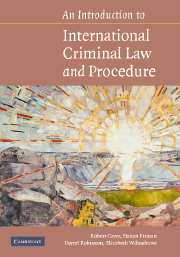Book contents
- Frontmatter
- Contents
- Preface
- Table of Cases
- Table of Treaties
- Table of Abbreviations
- Part A Introduction
- 1 Introduction: What is International Criminal Law?
- 2 The Objectives of International Criminal Law
- Part B Prosecutions in National Courts
- Part C International Prosecutions
- Part D Substantive Law of International Crimes
- Part E Principles and Procedures of International Prosecutions
- Part F Relationship Between National and International Systems
- Index
- References
1 - Introduction: What is International Criminal Law?
- Frontmatter
- Contents
- Preface
- Table of Cases
- Table of Treaties
- Table of Abbreviations
- Part A Introduction
- 1 Introduction: What is International Criminal Law?
- 2 The Objectives of International Criminal Law
- Part B Prosecutions in National Courts
- Part C International Prosecutions
- Part D Substantive Law of International Crimes
- Part E Principles and Procedures of International Prosecutions
- Part F Relationship Between National and International Systems
- Index
- References
Summary
International criminal law
International law typically governs the rights and responsibilities of States; criminal law, conversely, is paradigmatically concerned with prohibitions addressed to individuals, violations of which are subject to penal sanction by a State. The development of a body of international criminal law which imposes responsibilities directly on individuals and punishes violations through international mechanisms is relatively recent. It was not until the 1990s, with the establishment of the ad hoc Tribunals for the former Yugoslavia and for Rwanda, that it could be said that an international criminal law regime had evolved. This is a relatively new body of law which is not yet uniform, nor are its courts universal.
International criminal law developed from various sources. War crimes originate from the ‘laws and customs of war’, which accord certain protections to individuals in conflict situations. Genocide and crimes against humanity evolved to protect persons from gross human rights abuses including those committed by their own governments. With the probable exception of the crime of aggression with its focus on inter-State conflict, the concern of international criminal law is now with individuals and with their protection from wide-scale atrocities. As was said by the Appeal Chamber in the Tadić case in the International Criminal Tribunal for the former Yugoslavia (ICTY):
A State-sovereignty-oriented approach has been gradually supplanted by a human-being-oriented approach … [I]nternational law, while of course duly safeguarding the legitimate interests of States, must gradually turn to the protection of human beings …
The meaning of the phrase ‘international criminal law’ depends on its use, but there is a plethora of definitions, not all of which are consistent.
- Type
- Chapter
- Information
- Publisher: Cambridge University PressPrint publication year: 2007
References
- 2
- Cited by



